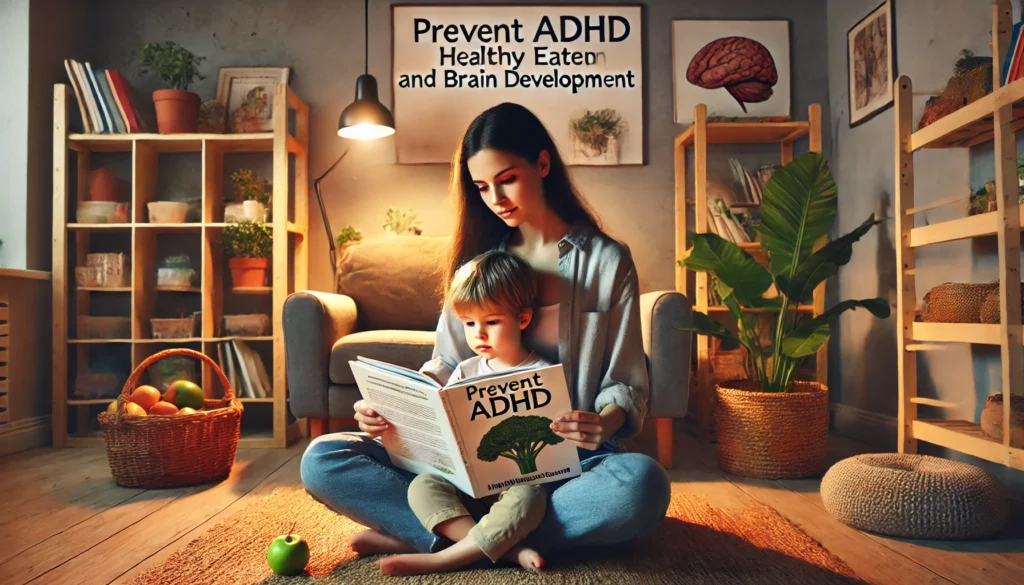Before we explore the nutritional aspects, it’s crucial to grasp what ADHD is. ADHD is a neurodevelopmental disorder characterized by symptoms such as inattentiveness, hyperactivity, and impulsiveness. It’s typically diagnosed in childhood, though it can persist into adulthood. While there is no single known cause of ADHD, genetics, environmental factors, and brain structure all play a role.
You may also like: Enhancing Concentration: Strategies for ADHD
Characteristics and Diagnosis
ADHD presents itself in three primary types: predominantly inattentive, predominantly hyperactive-impulsive, and combined. The symptoms can vary significantly among individuals, making diagnosis complex. While some may struggle with concentration, others may exhibit excessive energy and impulsivity. Diagnosing ADHD requires comprehensive assessments involving psychological testing, behavioral evaluations, and gathering detailed histories.
Genetic and Environmental Influences
Research has shown that ADHD tends to run in families, suggesting a strong genetic component. However, genetics alone don’t account for all cases. Environmental factors, such as prenatal exposure to toxins, low birth weight, and even early childhood exposure to lead, have been implicated in increasing the risk of ADHD. Understanding these influences is key to developing preventive strategies.
Brain Structure and Functionality
Studies using brain imaging technology have revealed structural differences in the brains of those with ADHD. These differences often involve the size and activity levels of certain brain areas, including the prefrontal cortex, which is crucial for attention and impulse control. These insights highlight the importance of targeting brain health in managing ADHD.
Can ADHD Be Prevented?
The question of whether ADHD can be prevented is complex. While there is no definitive way to prevent ADHD due to its multifaceted nature, emerging research suggests that certain lifestyle changes, including nutritional interventions, may influence its development or severity. Let’s explore how nutrition might contribute to ADHD prevention.
Nutritional Interventions and Their Potential
Nutritional interventions can potentially influence brain health and function, possibly reducing ADHD symptoms or delaying their onset. By focusing on a nutrient-dense diet, individuals may support optimal brain development and neurotransmitter balance, critical factors in managing ADHD.
The Role of Prenatal and Early Childhood Nutrition
Prenatal and early childhood nutrition play pivotal roles in brain development. Ensuring adequate maternal nutrition, rich in essential vitamins and minerals, can reduce the risk of neurodevelopmental disorders. Breastfeeding, when possible, is also encouraged, as it provides a balance of nutrients that support brain growth.
Lifestyle Changes Beyond Diet
Beyond diet, other lifestyle changes such as regular physical activity, sufficient sleep, and stress management can also contribute to the prevention and management of ADHD. These factors collectively influence brain health and development, highlighting the need for a holistic approach.
Nutrition and Brain Health
Our brains require a variety of nutrients to function optimally. Essential fatty acids, vitamins, and minerals play critical roles in brain development and neurotransmitter synthesis, both of which are crucial for maintaining focus and regulating mood—key areas affected by ADHD.
The Importance of a Balanced Diet
A balanced diet provides the foundation for brain health. Foods rich in diverse nutrients help support neurotransmitter production and protect brain cells from oxidative stress. Consuming a variety of foods ensures that the brain receives all necessary components for optimal function.
Neurotransmitter Synthesis and Regulation
Neurotransmitters like dopamine and serotonin are vital for mood regulation and focus. Certain nutrients, including amino acids, vitamins, and minerals, are precursors to these neurotransmitters. Adequate nutrition supports their synthesis and balance, potentially impacting ADHD symptoms.
Protecting the Brain from Oxidative Stress
Oxidative stress can damage brain cells, contributing to neurodevelopmental disorders. Antioxidants found in fruits, vegetables, and certain supplements help neutralize free radicals, protecting the brain. A diet rich in antioxidants may reduce the risk of ADHD or alleviate its symptoms.

Omega-3 Fatty Acids
Omega-3 fatty acids, particularly EPA and DHA, are well-known for their benefits in brain health. Studies have shown that individuals with ADHD often have lower levels of these essential fats. Incorporating foods rich in omega-3s, such as fish, flaxseeds, and walnuts, or taking supplements, may help improve attention and cognitive function.
Understanding EPA and DHA
EPA and DHA are long-chain omega-3 fatty acids crucial for brain structure and function. They are integral components of cell membranes in the brain, influencing fluidity and signaling pathways. These properties underscore their importance in cognitive processes.
Dietary Sources of Omega-3s
While fatty fish like salmon and mackerel are excellent sources of omega-3s, plant-based options such as flaxseeds, chia seeds, and walnuts also provide alpha-linolenic acid (ALA), a precursor to EPA and DHA. Including a variety of these foods in the diet ensures a steady supply of omega-3s.
Supplementation Considerations
For individuals unable to consume enough omega-3s through diet alone, supplements can be beneficial. Fish oil supplements are widely available, but it’s essential to choose high-quality products free from contaminants. Consulting with a healthcare provider can help determine appropriate dosages.
Micronutrients
Vitamins and minerals like zinc, iron, magnesium, and vitamin D are essential for brain health. Deficiencies in these nutrients have been linked to increased ADHD symptoms. Ensuring a diet rich in fruits, vegetables, lean proteins, and whole grains can help maintain adequate levels of these critical micronutrients.
The Role of Zinc and Iron
Zinc and iron are crucial for brain function and development. Zinc supports neurotransmitter production, while iron is vital for oxygen transport to the brain. Inadequate levels can impair cognitive function and exacerbate ADHD symptoms, emphasizing the need for sufficient intake.
Magnesium’s Impact on the Brain
Magnesium plays a role in over 300 biochemical reactions in the body, including those related to brain health. It helps regulate neurotransmitter activity and has a calming effect on the nervous system. A diet rich in magnesium can support focus and reduce hyperactivity.
Vitamin D and Its Neurological Benefits
Vitamin D, often called the “sunshine vitamin,” is essential for brain health. It modulates the immune system and may influence mood and behavior. Ensuring adequate vitamin D levels through sunlight exposure and dietary sources can contribute to reducing ADHD symptoms.

The Impact of Sugar and Additives
One area of concern for ADHD is the consumption of sugar and food additives. High sugar intake has been associated with hyperactivity in some children, although this is still a topic of debate. Additionally, certain food colorings and preservatives may exacerbate ADHD symptoms in susceptible individuals. Reducing the intake of processed foods and sugary snacks can be a beneficial strategy in managing symptoms.
The Controversy Around Sugar
The link between sugar and hyperactivity remains debated. Some studies suggest that sugar consumption can lead to behavioral changes in children, while others find no significant effects. Despite conflicting evidence, limiting sugar intake can contribute to overall health and well-being.
Identifying Harmful Additives
Food additives like artificial colors, flavors, and preservatives have been scrutinized for their potential impact on ADHD symptoms. Some children may be more sensitive to these substances, experiencing increased hyperactivity or attention difficulties. Reading labels and choosing additive-free products can help manage symptoms.
Strategies for Reducing Sugar and Additives
Adopting a diet focused on whole, unprocessed foods can naturally reduce sugar and additive intake. Opting for fresh fruits instead of sugary snacks and preparing meals at home using whole ingredients are effective strategies. These changes support not only ADHD management but also long-term health.
The Gut-Brain Axis
Emerging research on the gut-brain axis highlights the importance of gut health in mental well-being. The gut microbiome, which can be influenced by diet, plays a role in producing neurotransmitters and regulating inflammation. A diet rich in fiber, fermented foods, and probiotics can support a healthy gut microbiome, potentially impacting ADHD symptoms positively.
Understanding the Gut-Brain Connection
The gut and brain communicate through a complex network of signals, influencing each other’s function. This communication involves neurotransmitters, immune pathways, and the vagus nerve. A healthy gut can support brain health, highlighting the potential of dietary interventions in managing ADHD.
The Role of the Microbiome
The gut microbiome consists of trillions of microorganisms that play a role in digestion, immunity, and neurotransmitter production. An imbalance in gut bacteria has been linked to various mental health conditions. Supporting a diverse microbiome through diet can positively influence ADHD symptoms.
Dietary Strategies for Gut Health
Incorporating fiber-rich foods like fruits, vegetables, and whole grains promotes a healthy microbiome. Fermented foods such as yogurt, kefir, and sauerkraut provide probiotics that support gut health. These dietary strategies can enhance the gut-brain connection, potentially benefiting individuals with ADHD.
Practical Dietary Changes for ADHD
Based on current research, here are some practical dietary changes that may help in the management and potential prevention of ADHD:
Emphasize Whole Foods
Focus on a diet rich in whole, unprocessed foods. This includes plenty of fruits, vegetables, whole grains, lean proteins, and healthy fats. These foods provide the essential nutrients needed for brain health.
Limit Sugar and Processed Foods
Reduce the consumption of sugary snacks, sodas, and processed foods that can contain additives and preservatives. Instead, opt for natural sweeteners like honey or fruits.
Include Omega-3 Rich Foods
Incorporate sources of omega-3 fatty acids into your diet, such as salmon, chia seeds, and flaxseeds. If necessary, consider omega-3 supplements, especially for children who may be picky eaters.
Monitor Food Sensitivities
Some children with ADHD may have food sensitivities that exacerbate their symptoms. Keeping a food diary and working with a healthcare professional can help identify and eliminate these potential triggers.
Encourage Regular Meal Patterns
Establishing regular meal patterns can help stabilize blood sugar levels and support cognitive function. Consistent meal times ensure that the brain receives a steady supply of nutrients throughout the day, reducing fluctuations in energy and concentration.

The Future of ADHD and Nutrition
As research continues to evolve, the hope is that we will uncover more definitive answers about the role of nutrition in ADHD prevention and management. The potential to mitigate symptoms through dietary changes offers a promising avenue for those affected by ADHD and their families.
Emerging Research and Innovations
Ongoing studies are exploring the intricate connections between diet and ADHD, with promising results. Innovative approaches, such as personalized nutrition plans based on genetic testing, are being investigated. These advancements could revolutionize ADHD management and prevention strategies.
Collaboration Between Health Professionals
Effective ADHD management requires collaboration between healthcare providers, nutritionists, and families. By working together, these groups can develop comprehensive care plans that incorporate dietary changes, behavioral therapies, and medical interventions, optimizing outcomes for those with ADHD.
The Role of Public Health Initiatives
Public health initiatives focusing on education and awareness about the impact of nutrition on mental health can drive significant change. By promoting healthy eating habits from a young age, these programs can support brain development and potentially reduce the prevalence and severity of ADHD.
Conclusion
While we may not have all the answers yet, it’s clear that nutrition plays a vital role in our mental health and can influence ADHD symptoms. By making informed dietary choices, we can take proactive steps in supporting brain health and potentially mitigating the impact of ADHD.
Whether you’re a health and wellness coach guiding clients, a science journalist translating research, or a biohacker optimizing your health, understanding the interplay between nutrition and ADHD is a valuable tool in your arsenal. As we continue to explore this exciting field, staying informed and open to new findings will be key in harnessing the power of nutrition for mental well-being.
Taking Action for Better Brain Health
Empowering individuals and families with knowledge about nutrition’s impact on ADHD is crucial. By adopting healthier eating habits and being mindful of the foods we consume, we can actively contribute to better brain health and improved quality of life for those with ADHD.
Continuing the Conversation
Open discussions about ADHD and nutrition can lead to greater awareness and acceptance of dietary interventions. Encouraging dialogue among researchers, healthcare providers, and the public fosters a collaborative environment for discovering new solutions and advancing our understanding of ADHD.
Looking Ahead
As we look to the future, the potential for nutritional strategies to play a central role in ADHD management is promising. Continued research and innovation in this area will be essential in developing effective, evidence-based approaches that can transform the lives of individuals with ADHD and their families.
Further Reading:
Adult attention-deficit/hyperactivity disorder (ADHD)
Attention-Deficit/Hyperactivity Disorder (ADHD)
Important Note: The information contained in this article is for general informational purposes only, and should not be construed as health or medical advice, nor is it intended to diagnose, prevent, treat, or cure any disease or health condition. Before embarking on any diet, fitness regimen, or program of nutritional supplementation, it is advisable to consult your healthcare professional in order to determine its safety and probable efficacy in terms of your individual state of health.
Regarding Nutritional Supplements Or Other Non-Prescription Health Products: If any nutritional supplements or other non-prescription health products are mentioned in the foregoing article, any claims or statements made about them have not been evaluated by the U.S. Food and Drug Administration, and such nutritional supplements or other health products are not intended to diagnose, treat, cure, or prevent any disease.


